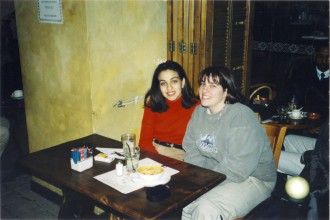In interviewing Tom from Eurocheapo, I learned more about how he came up with the decision to start Eurocheapo and how it has helped budget travelers plan their own trips.
1) How did you come about the decision to start Eurocheapo in the fall of 2000?
You could say that I found myself in a “cubicle panic” in 2000. I had been working at an internet start up company for two years in New York, and, although the job was quite fun (it was the dot-com “boom” after all), I dreamed of travel. So, I hatched a plan to start a website that would recommend the best cheap places to stay in the middle of the most expensive cities in Europe. These were, not coincidentally, all cities that I was really eager to visit.
I was especially excited about this because I realized that if I made a business out of hotel recommendations, I’d have to go back frequently to make sure the places were still up to snuff. So I took the dot-com knowledge that I had acquired at the internet company and used it to “force me” to travel full-time.
2) Did you see a need for these types of services where you help travelers find a way to travel on the cheap and yet still enjoy the cities they are visiting?
I certainly saw a need for EuroCheapo. I had spent my junior year of college studying abroad in Paris in 1995-1996, and traveled quite a bit by myself and with friends. I saw a wide range of ages in the budget hotels and hostels I stayed in, and I noticed that we were all relying upon the same three or four guidebooks. Years later when I was trying to cook up an idea for a travel website, I thought that I could focus my attention on this very specific niche: offering advice to budget travelers. And, as it would be on the web, it would be free.
3) How did you decide on making New York your home base for Eurocheapo in 2002 instead of any other city or country in the world?
I moved to Berlin in 2001 and developed and launched the site from there during the summer of that year. Of course, the tragic events of September of 2001 changed quite a few things, including the way people traveled. I found myself increasingly on the phone with my family and friends back in New York. It was a really difficult time for everyone, including for those of us living abroad.
So, I decided to pack up my things and move back home to New York to be closer to family and friends. Since then, of course, I’ve come close to moving back to Europe (constantly toying with moving back to Berlin or Paris). Right now I take about three or four trips a year to Europe, and rely on our correspondents to do the rest of the hotel visits, blogging and article writing.
4) How do you choose your staff, correspondents and contributors that will be working for you?
We have many ways of finding our writers and contributors. When we’re updating a city and need a new hotel reviewer or blogger, we usually ask around on Twitter and then advertise on sites like Craigslist (on the specific city versions of the site, like Craigslist Paris, Rome, etc.) and also on various expat websites. This works pretty well for us. We also work with writers who have just emailed us out of the blue!
5) What advice can you give someone who wants to travel as long as possible on a budget but doesn’t know how to go about doing it?
First of all, I would say “go for it!” When people ask me about how to get started planning a trip to Europe, I first encourage them to get specific. Are there certain cities, places or regions that you’ve been dreaming of? Find photos, watch videos on YouTube, flip through magazines — what entices you? Traveling is about more than getting away, it’s about going some place. Where?
Next consider the timing: When can you go? Now? During the summer? Are there specific dates? Does this impact the destinations you’re considering?
Then make up a travel budget. It can be on a sheet of paper, spreadsheet, email, whatever. First list out the “big ticket” items: airfare, hotels/hostels/apartments in these cities, meal allowance, transportation between your destinations, and a daily sightseeing and shopping allowance. Try to be realistic, and give yourself a little room for unexpected charges. Can you afford this? What can you save on? Can you move your trip to the “off season,” thus saving on airfare and hotels? Maybe you need to save up for a few more months. Just don’t put it off indefinitely.
Finally, don’t let the small stuff delay your trip. Trust your own improvisational skills once you’re abroad. You don’t really need to print off walking directions from the train station to your hotel in Milan. You’ll figure it out when you get there. Think you need to convert a wallet-full of dollars to euros before you arrive? Not really–you can just take money out of an ATM at the airport. Stressing about finding a perfect dinner spot in Paris weeks before you even take off? You’ll know so much more once you’re there, and be open to the serendipity that’s a key part of travel!
Most importantly, just do it. You won’t regret it.








